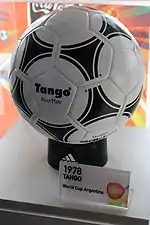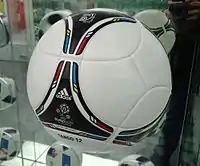Adidas Tango
The Adidas Tango is a successful family and brand of association football balls originally introduced as the "Tango Durlast" in 1978, specifically for the 1978 FIFA World Cup in Argentina. Variations of the design had been produced for various competitions including the FIFA World Cup, the UEFA European Championship, and the football competition of the Summer Olympics. The Tango balls have had different names applied to them to distinguish them in their construction, the competitions they have been used for, and even if they are official match balls or replica balls.
 Adidas Tango 'River Plate' used in the 1978 World Cup | |
| Type | Association football |
|---|---|
| Inventor | Adidas |
| Inception | 1978 |
| Manufacturer | Adidas |
In 2011, Adidas introduced the new Tango 12 ball, but aside from the name there are no particular similarities between the new ball and the old Adidas Tango family.
Tango Durlast
The 1978 Tango Durlast consisted of twenty identical hexagonal panels with 'triads' creating the impression of 12 circles around the pentagons. The Adidas Tango Durlast ball was made of genuine leather with a shiny waterproof plastic coating.
Tango España
The Tango España by Adidas was the official match ball of 1982 FIFA World Cup held in Spain. The Tango España had improved water resistant qualities through its rubberized seams. These proved to be not very durable and resulted in the ball having to be changed several times during some games. This ball was the last genuine leather ball to be used in the World Cup.[1]
Tango variations

| Year | Tango variation | Competition | Additional information |
|---|---|---|---|
| 1978 | Adidas Tango Durlast | 1978 FIFA World Cup | The ball was initially introduced as the Tango Durlast, however further production models were also branded as Tango River Plate. Replica variations include the Tango Rosario [2] |
| 1980 | Adidas Tango River Plate | UEFA Euro 1980 | [3] |
| 1982 | Adidas Tango España | 1982 FIFA World Cup | Replica variations include the Tango Barcelona.[2] Other variations include the Tango Mundial, Tango Alicante, Tango Malaga and Tango Indoor [4] |
| 1984 | Adidas Tango Mundial | UEFA Euro 1984 | |
| Adidas Tango Sevilla | 1984 Summer Olympics | Used for the 1984 Summer Olympic Games in Los Angeles — compared to previous Tango the only addition is the competition logo [5][6] | |
| 1988 | Adidas Tango Europa | UEFA Euro 1988 | |
| Adidas Tango Séoul | 1988 Summer Olympics | ||
| 2012 | Adidas Tango 12 | UEFA Euro 2012 | New design Adidas Tango, including Adidas Tango Argentina 12, Torfabrik, Comoequa, The Albert, Prime and Adidas Tango 12 |
Other variations of the Tango ball seen include: Tango Roma, Tango Napoli, Tango Munich, Tango Scorpion, Tango Mendoza, Tango Gol, Tango Indoor Ball, Tango Tournoi [7]
For the newer family of footballs that are branded Tango please see Adidas Tango 12.
Use in heraldry
Adidas Tango ball is featured on the club badge of Ukrainian club Chornomorets Odessa, as well as Russian football team Mordovia Saransk.
See also
References
- "Soccerball World". Soccerball World. Retrieved 2014-03-06.
- "Nightly.net forum on rare soccer balls". Retrieved 9 June 2012.
- "History of the Official European Championship Match Balls". Retrieved 21 Aug 2014.
- "Soccer Ball World: Tango Espana". Soccer Ball World. Retrieved 9 June 2012.
- "Soccer Ball World: Olympic Ball 1984". Soccer Ball World. Retrieved 9 June 2012.
- "(Spanish) Official ball of LA Olympics". Archived from the original on 6 March 2014. Retrieved 9 June 2012.
- "Soccer History Online: Match Balls". Archived from the original on 23 June 2012. Retrieved 9 June 2012.
External links
| Wikimedia Commons has media related to Adidas Tango. |
- Tango balls on Adidas website
- Adidas ball history
- Soccerball World: History of the World Cup's Match Balls
- The Guardian - The Joy of Six: great footballs
- The History of FIFA World Cup Match Ball
| Preceded by Telstar Durlast |
FIFA World Cup official ball 1978–1982 |
Succeeded by Azteca |
| Preceded by Telstar Durlast |
UEFA European Championship official ball 1980, 1984, 1988 |
Succeeded by Etrusco Unico |

